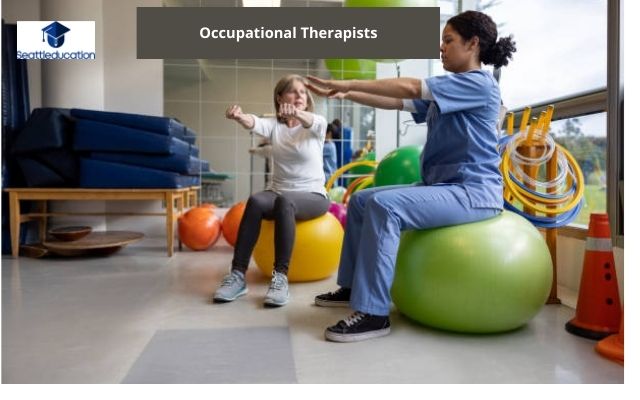Careers In Special Education Besides Teaching: Best Answer
Careers In Special Education Besides Teaching: Working in the field of special education can be incredibly rewarding but many don’t realize there are more than just teaching opportunities available. There is a vast array of career paths you can take that involve working with and supporting children with disabilities or special needs.
In this article, we will explore some alternative options for those looking to pursue a career in special education beyond traditional teaching roles. Whether your passion lies in research, technology or advocacy, there are plenty of ways to make an impact on the lives of students living with disabilities or special needs.
Let’s get started!
Psychologists
Psychologists play a key role in the field of special education. They work with students to assess their abilities, identify any learning disabilities or psychological issues that may be affecting them, and develop strategies for helping them succeed academically and socially.
Psychologists also frequently collaborate with teachers to create an optimal educational environment for each individual student, by taking into account their unique strengths and weaknesses.

In addition to providing direct services to children, psychologists are often involved in research related to various aspects of special education. This can include exploring new teaching methods and technologies, conducting studies on how different types of instruction might impact student achievement, or examining factors such as poverty and inequality that can limit access to quality education.
By researching these topics, psychologists contribute valuable insights which help shape policy decisions regarding special education programs.
Physical Therapists
Physical Therapists (PTs) are another career option in special education. Their primary responsibility is to help people with physical disabilities increase their mobility and strength, as well as restoring function following an injury or illness. Physical therapists will work closely with the patient’s family to ensure that everyone involved is on the same page about what needs to be done for a successful outcome.
Here are three ways PTs can positively impact those with special educational needs:
1. Develop specialized exercises specific to the individual’s disability so they can improve their range of motion and exercise tolerance
2. Provide guidance regarding proper posture and movement patterns for independence
3. Offer therapeutic modalities such as ultrasound, electrical stimulation, and heat/cold therapy when appropriate
With this kind of care, individuals with disabilities have greater potential to reach their goals and maximize functional outcomes while leading healthy lives.
Speech-Language Pathologists
Physical therapists are an important part of the special education team, helping to assess and treat movement-related issues. But there is another profession that can help children with special needs: speech-language pathologists.

These professionals specialize in evaluating and treating communication problems such as difficulty speaking, understanding language, or learning how to use appropriate social skills when interacting with others. Speech-language pathologists may also work closely with teachers to develop strategies for classroom success.
Speech-language pathologists will usually meet with parents and their child on a regular basis to monitor progress and provide support when needed. They’ll also often collaborate with other members of the special education team like school psychologists and occupational therapists to create individualized plans tailored to each student’s specific needs.
With this holistic approach, they strive to give students the tools they need to excel academically and socially.
Occupational Therapists
Occupational therapists are an important part of the special education team and play a key role in helping individuals with disabilities learn how to function better at home, school, or work. They use activities that focus on physical coordination, self-care skills, problem solving, judgment and decision making abilities, as well as fine motor control to improve their patients’ independence.

OTs may work with children who have sensory processing difficulties to help them understand the world around them and find ways to participate in daily activities safely. They also provide support for those with autism spectrum disorder (ASD) by assisting them with developing routines for everyday life tasks and teaching strategies for managing behaviors associated with ASD.
OTs create individualized treatment plans based on assessments of each patient’s needs and goals. To do this effectively they must collaborate closely with other professionals such as teachers, parents, psychologists, and speech-language pathologists.
Through ongoing communication between all parties involved in the process, OTs can ensure that everyone is working together towards a common goal: providing quality care to best meet the needs of their patients.
Behavior Analysts
Behavior analysts are an important part of special education. They work to help modify and improve the behavior of individuals with disabilities. These professionals use a variety of methods, such as positive reinforcement, to encourage desired behaviors.
Some key roles for behavior analysts include:
* Observing student’s daily activities in order to document their behavior patterns
* Implementing behavioral intervention techniques designed specifically for each individual
* Collaborating with teachers and other staff members on strategies that will benefit students
Behavior analysts play a crucial role in helping children with disabilities reach their full potential. By employing evidence-based practices, they enable those with special needs to take part more fully in school and home life. This can lead to improved social skills, communication abilities, self-esteem, and overall quality of life for the individual.
Special Education Administrators
It goes without saying that teaching is a critical role in special education, but there are many other exciting opportunities for those interested in the field.
Special Education Administrators are proficient professionals who bring together educational resources to ensure high-quality programs and services for students with disabilities. As such, they play an invaluable part in creating and managing successful learning environments.
The following table outlines some of the primary duties associated with this career:
| Duties | Description |
| Planning | Developing plans & strategies |
| Advising | Providing guidance & support |
| Analyzing | Evaluating data & trends |
| Networking | Connecting with stakeholders |
| Reporting | Documenting student progress |
A Special Education Administrator’s daily activities often involve working closely with teachers, parents, administrators, and government agencies. They must be knowledgeable about laws related to special education as well as have excellent communication skills.
Furthermore, their experience may include budget management, policy development, personnel supervision, team building, and public relations. It is safe to say that these individuals make invaluable contributions to our communities by advocating on behalf of children with special needs.
Technology Specialists
Technology Specialists are an integral part of special education. They assist teachers in managing and providing technical support to students with disabilities. As a Technology Specialist, you can work either independently or as part of a team to provide specialized services such as computer-aided instruction, software development, assistive technology training, multimedia presentations, and more.
Some tasks that may be performed by a Technology Specialist include:
* Developing and implementing educational strategies for students with disabilities using technology tools
* Assessing the needs of individual learners and creating customized learning plans
* Designing digital resources tailored specifically to each student’s unique needs
* Troubleshooting any technical issues that arise during instructional sessions
You’ll also need strong interpersonal skills since much of your job involves working directly with both teachers and students. It is important for you to have excellent problem solving abilities so that you can quickly diagnose any potential issue and find solutions.
Additionally, having experience in computer programming will be beneficial when it comes to developing new technologies or making modifications to existing ones.
Social Workers
Technology specialists play a crucial role in the world of special education, particularly when it comes to incorporating technology into classrooms. They help design and execute educational plans that incorporate audio-visual materials, computers, and other forms of technology. Technology specialists can also provide training for teachers on how to use new tools and resources.

Social workers are another important part of the special education team. Social workers act as advocates for students by helping them with their social, emotional, behavioral, or mental health needs. They work closely with teachers and families to ensure students receive an appropriate level of support both inside and outside the classroom setting.
Additionally, they may provide guidance counseling services such as career exploration or problem-solving skills development. By addressing each student’s unique needs holistically, social workers contribute significantly to providing every child with a successful learning experience.
Conclusion
In conclusion, those interested in working with students who have special needs have several avenues open to them. Before deciding on a career path, it’s crucial to assess your own strengths and weaknesses.
Anyone who puts in the time and effort to acquire the necessary skills and knowledge can establish a rewarding career working with people who have special needs. Witnessing a student’s growth as they realize their own potential is a rewarding experience. Careers in special education are rewarding and exciting, and a great option for those who want to make a difference in the lives of others.






